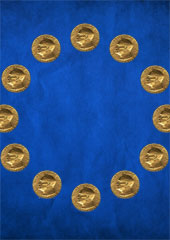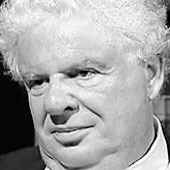Europe’s Nobel and the Sine Wave of War
The European Union’s Nobel Peace Prize doen’t ensure peace in the future.
October 17, 2012

New centuries usually bring well-meaning hopes that we are about to enter a bright new world of peace, prosperity and international cooperation.
Unfortunately, the hard evidence of modern world history tells a very different story. As old rhythms prevail, a clash of nations and civilizations on an unprecedented scale may lie ahead.
Look upon past, recurring patterns of war in Europe and try to view them as a recurring sine wave. “Bad” events peak in the first half of every century, then things settle down for the second half of the century, but then things heat up again.
This sounds simplistic, but it has been the pattern of war and peace across the European continent for 600 years now. In the early first half of the 15th century, the Hundred Years War peaked in France until, in 1429, Joan of Arc led the national revival that rolled the English back. The war finally ended in 1453.
In the first half of the 16th century, Germany was torn apart by ferocious peasant rebellions and religious wars in which millions died. Things quieted down for a couple of generations, but then the old modus operandi prevailed again.
From 1618 to 1648, Germany was virtually depopulated. Religious wars laid waste to much of the rest of Europe until the 1648 Peace of Westphalia ushered in a long period of stability and slow recuperation.
Napoleon’s wars
The 18th century began with the wars of the Spanish and Austrian Succession, which lasted from 1701 to 1714 and from 1740 to 1748, eerily foreshadowing the time periods of the 20th century’s two world wars. In the 1790s, France was torn apart by a bloody, but entirely domestic social revolution.
But soon enough, in 1805, Napoleon Bonaparte set off to conquer most of Europe — all in the very French, albeit now post-revolutionary name of liberty, equality and fraternity.
His victories included the defeat and conquest of the Austrian Empire in 1805, and the defeat and conquest of Prussia in 1806. He eventually tried to bite off too much, seeking to conquer Russia in 1812.
As an exception to the rule, there were a series of relatively small wars in Europe in the second half of the 19th century, specifically in the 1860s.
They propelled a united Prussia to continental supremacy at the heart of a finally united Germany following the 1870-71 Franco-Prussian War.
The first half of the 20th century was the ultimate age of war in Europe. Between 7 million and 10 million people died in World War I. At least 50 million died in World War II — most of them in Europe, most of the rest in Japan and China.
After two world wars within the space of 30 years, Europe has thankfully enjoyed nearly six and half decades of unparalleled peace and prosperity since.
United States Vs Soviet Union
For 44 years from 1945 to 1989, the European continent was divided between two mighty military alliances organized by the United States and the Soviet Union.
Since the disintegration of the Soviet Union at the end of 1991, the U.S.-led North Atlantic Treaty Organization has peacefully expanded to include most of the continent, with the exception of fragmented Yugoslavia, where a series of fierce but localized ethnic conflicts boiled from 1991 to 1995.
This is not to say the second half of either the 19th or 20th centuries was peaceful in other parts of the world. Africa and Asia were torn apart by wars of European colonial conquest in the second half of the 19th century, as well as by endless anti-colonial uprisings in the second half of the 20th century.
By some estimates, more people died in Africa and Asia in wars in the second half of the 20th century than were killed in the world wars of the first half of the century.
Whatever one thinks of it, this recurring sine wave-type pattern of the rise and fall of violence in Europe augurs ill for the first decades of the 21st century.
It suggests that the kind of major wars between nation-states (or alliances of nation-states) that that have torn the continent apart in the past could recur in the future.
Europeans unprepared for conflict?
It also suggests that moves to reduce the size of European armies and to make them “lean and efficient” may be ill-suited to the future challenges that the democratic nations of the European Union will face.
One would hope not. But unless we have finally beaten back old historical patterns for good, Europeans risk being unprepared for conflict, much as the Americans were before WWI.
The potential for conflict is certainly there, if not any longer, one would hope, in the region itself. At a minimum, the very real prospect of having huge and continuing immigration into the European Union from the Middle East, the Maghreb and sub-Saharan Africa has to be dealt with.
If the process gets out of hand (and given those regions’ exploding population numbers it well might), this may at a minimum result in needing far larger numbers of police on the streets of cities to ensure public security.
We may also see far stronger border defenses. If things get really problematic, we may witness measures along the lines pioneered by Israel, Saudi Arabia and India in setting up strong passive defenses, including high tech security fences hundreds of miles long in controlling annual immigration and guerrilla incursions.
EU not immune forever
For now, the European Union remains a blessed island of peace and prosperity in a world of more than seven billion people. We ardently hope it stays that way.
But if the troubling sine waves of history were to rear their ugly head again, we Europeans cannot count on remaining forever immune to future wars.
The rapidly growing, additive pressures resulting from the parallel occurrence of migration shifts, booming and impoverished populations, as well as environmental catastrophes, especially those caused by climate change, are increasingly devastating Africa, Eurasia and the Middle East.
The EU richly deserves its Nobel Prize, but it had better prepare to defend its achievements and play a stronger global role. Otherwise, the world will have reason to be very nervous yet again, when the 100th anniversary of the 2012 Nobel Peace Prize rolls around.
Takeaways
After two world wars within 30 years, Europe has thankfully enjoyed nearly six and half decades of peace and prosperity since.
Religious wars laid waste to much of Europe until the 1648 Peace of Westphalia ushered in a long period of stability and recuperation.
"Bad" events peak in the first half of the century, then things settle down for the second half, but then things heat up again.

